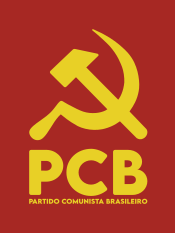Brazilian Communist Party Partido Comunista Brasileiro | |
|---|---|
 | |
| Abbreviation | PCB |
| General Secretary | Edmilson Costa |
| Founded | March 25, 1922 |
| Newspaper | People's power |
| Think tank | Dinarco Reis Foundation |
| Youth wing | Communist Youth Union |
| Women's wing | Classist Feminist Collective Ana Montenegro |
| Website | |
| https://pcb.org.br | |
| Part of a series on |
| Communist parties |
|---|
The Brazilian Communist Party (PCB, Partido Comunista Brasileiro) is a Brazilian political party that defines itself as a party of militants and revolutionary cadres that are formed in the class struggle, in the organization of the proletariat, and in the study of the works of Karl Marx and Friedrich Engels. Its theoretical basis for practical action is Marxism-Leninism, which is based on the principles developed by Vladimir Lenin.
Its symbol, according to its statutes, "is a sickle and a hammer, crossed, symbolizing the worker-peasant alliance, under which the legend 'Brazilian Communist Party' is written". Its electoral code number is 21. In October 2020 the PCB had 12,754 affiliates according to the Supreme Electoral Court [1], however, the vast majority of their militants are not officially registered.
History
Early years
Until the 1920s, the labor movement in Brazil was basically led by anarchists. Striking movements, sporadic in the early years of the Republic, became more frequent from the beginning of the 20th century, sometimes having state or national reach. The main demands of the movements were to improve wages, reduce the working day to eight hours, regulate the work of women and children, and stipulate weekly rest.
The Russian Revolution of 1917 awakened the interest of anarchists in the ideas of Karl Marx and Friedrich Engels. Thus, in 1918, former anarchist militants sympathetic to communism founded the Communist League of Livramento, and the following year the Lebanese barber Abilio de Nequete founded the Maximalist Union. The term "maximalist" was used to refer to Bolsheviks at that time.
Despite the initial identification between anarchists and communists, disagreements soon began to sharpen. In Brazil, while the group led by Astrojildo Pereira defended and disseminated the program of the Communist International, part of the anarcosyndicalist movement launched violent attacks on the III International. The newspaper A Plebe, for example, which circulated in São Paulo until 1935, denounced in 1920 "Bolshevik terror" in Russia. With the beginning of the shootings of anarchists in the Soviet Union, the rupture between anarchists and communists was also consummated in Brazil.
A small group led by Astrojildo Pereira, on the November 4, 1921 founded the Communist Group of Rio de Janeiro, the first of a series of communist nuclei to be established in other states.
The goal of the Communist Group was to become the Communist Party of Brazil, after fulfilling the 21 conditions necessary for admission to the Communist International. To be accepted, the parties had to fundamentally adopt the name of communists, dissociate themselves from all reformist positions, and fight for the revolutionary overthrow of capitalism and the establishment of the dictatorship of the proletariat. [2]
Dissolution of the old party and reconstruction period. (1992 — 2001)
After the fall of the Brazilian military dictatorship, a group led by Roberto Freire which held a majority within the party leadership of the former PCB, declared the extinction of the party, and the creation, in its place, of the Popular Socialist Party (PSP/PPS).
The convention, considered controversial, ended up being recognized by the Superior Electoral Court of Brazil. Older members classified the action of the group linked to its then president, Roberto Freire, as a coup, and decided to launch a founding notice for a new party, which would then use the name of the now defunct association: Brazilian Communist Party [3].
The PCB today (2002 —)
With the rise of widespread reactionary rethoric in Brazil, the entire left spectrum faces a new challenge. In more recent years, when it became clear that the right would completely win over electoral politics, the PCB held its 15th National Congress in São Paulo [4], in which it discussed the need to build a broad anti-capitalist and anti-imperialist front, in addition to taking stock and prospects of the process revolutionary reconstruction of the PCB. The prospects of alliance were exemplified when, in 2018, the PCB created a coallition with the PSOL (which in of itself is already a union of smaller sects of the left) for the 2018 general elections in Brazil.[5]
The PCB has recently bolstered its propaganda efforts, investing into its current publication, People's power (O poder popular), since 2018. The PCB has never been successful in electoral politics and are most likely to lose their only city council member in the 2020 mayoral elections. Over the years, their focus has shifted to militant work and social work towards desperate communities in Brazil.[6]
Congresses
I Congress — 1922
II Congress — 1925
III Congress — 1929
IV Congress — 1954
V Congress — 1960
VI Congress — 1967
VII Congress — 1982
VIII Congress — 1987
IX Congress — 1991
X Congress — 1993
XI Congress — 1996
XII Congress — 2000
XIII Congress — 2005
XIV Congress — 2009
XV Congress — 2014
References
- ↑ Supreme Electoral Court - Affiliates
- ↑ http://www.fgv.br/cpdoc/acervo/dicionarios/verbete-tematico/partido-comunista-brasileiro-pcb
- ↑ A Criação do PPS (Archived Copy)
- ↑ Resolutions of the 15th National Congress.
- ↑ ANDRIOLA, Carolina. PSOL formalizes alliance with the PCB. Journal of Commerce, Rio Grande do Sul. 16th of July, 2018 (In Portuguese)
- ↑ [15th NC] Revolutionary Reconstruction (Point 87)
External sources
http://www.fgv.br/cpdoc/acervo/dicionarios/verbete-tematico/partido-comunista-brasileiro-pcb Template:External links